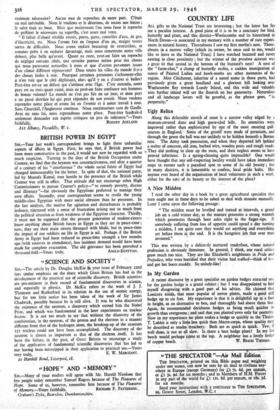BRITISH POWER IN EGYPT
Sta,—Your last week's correspondent brings to light three unfamiliar aspects of affairs in Egypt. First, he says that, if British power had been more constructive in the past, it would not now be regarded with so much suspicion. Turning to the days of the British Occupation under Cromer, we find that the keynote was constructiveness, and after a quarter of a century of his " interference " the whole social fabric of Egypt had changed immeasurably for the better. In spite of that, the national party, led by Mustafa Kamal, rose hostile to the presence of the British while Cromer was still in office. That attitude did not encourage other High Commissioners to pursue Cromer's policy—" to remedy poverty, disease and illiteracy "—for obviously the Egyptians preferred to manage their own affairs. Secondly, your correspondent seems to credit the young middle-class Egyptian with more social altruism than he possesses. In the last analysis, the motive for agitation and disturbances is probably jealousy, tinctured with a sense of frustration arising not so much from the political situation as from weakness of the Egyptian character. Thirdly, it must not be supposed that the present generation of student-rioters know anything about British forces in Egypt as they are in peace-time ; now, they see their main streets thronged with khaki, but in peace-time the impact of our soldiers on life in Egypt is nil. Perhaps if the British Army in Egypt had been reduced to peace-time strength a few months ago (with reserves in attendance), less insistent demand would have been made for complete evacuation. The old grievance has been provoked a


























 Previous page
Previous page